印尼环境法律和法规(英文版)
印尼法律环境

印尼法律环境【概况】总的来说,印尼的法律环境并不理想。
印尼外商投资急剧下降,乃至撤资的重要原因之一,就是法律环境恶化。
外商纷纷抱怨印尼法律的不完善、不确定和不公正,中央政府缺乏有关地方自治的法律法规,新投资法的不确定性以及劳工法的不公平问题等。
为了改善投资环境,印尼对外国投资法和劳工法进行了一些有利于外国投资者的修改,并简化了审批程序。
印尼国会签署了新的劳工法,旨在为工人提供更多的合法保护,同时创造积极的投资气候,法令兼顾了劳工和雇主的利益。
此后,国会将进一步商讨新的劳资双方冲突解决的法案,以代替现行法案。
现印尼政府正在修正破产法以改善司法确定性。
如果公司重整法案正式成为法律,将是印尼被视为有司法确定性的里程碑。
【基本法律制度】1、一般法律体系及其健全程度现行宪法为《“四五”宪法》(1945年制定)。
按宪法规定,人民协商会议和人民代表会议(亦称国会)均是国家立法机构。
人民协商会议是国家最高权力机构,负责制定、修改与颁布国家宪法和大政方针。
人民代表会议行使除起草和修改宪法、制定国家大政方针之外的一般立法权。
司法机构由各类法院组成。
印尼法院分为一般法院、宗教法院、军事法院和行政法院。
所有法院不受外来因素影响,独立行使其职责。
印尼实施三权分立,立法、司法各司其职。
但是,印尼的法律体系并不健全。
例如:中央政府实行地方自治,却缺乏有关地方自治的法律法规,新投资法不确定等。
印尼现行破产法被批评为没有确定性且毫无逻辑的法律。
因为该法并没有规定必须欠多少钱才可申请破产。
劳工法则过于偏袒劳工,没有体现法律的公平性及公正性。
而且印尼国内司法腐败严重,有法不依、执法不严。
2、外资引入法律规定印尼政府对外国投资始终持欢迎态度,实行开放政策。
印尼涉及外国投资方面的法律有: 1967年第一号法律一一《外资法》1970 年第十一号法律一一《外资法》(修改版),1994 年第二十号政府令。
(1)外商投资范围1)印尼法律禁止外资或内资投资的行业或领域有:各类毒品种植及加工、酒类及酒精饮料生产、爆炸物(爆竹和烟花)生产、武器及其零部件生产、铀矿及放射性矿开采、赌场及博彩业、海绵开采、森林开发、红木加工以及被认为危害人体健康和破坏环境(有毒杀虫剂、有毒生产工艺、氟里昂制冷剂) 的行业等。
印度尼西亚新矿业法摘要翻译
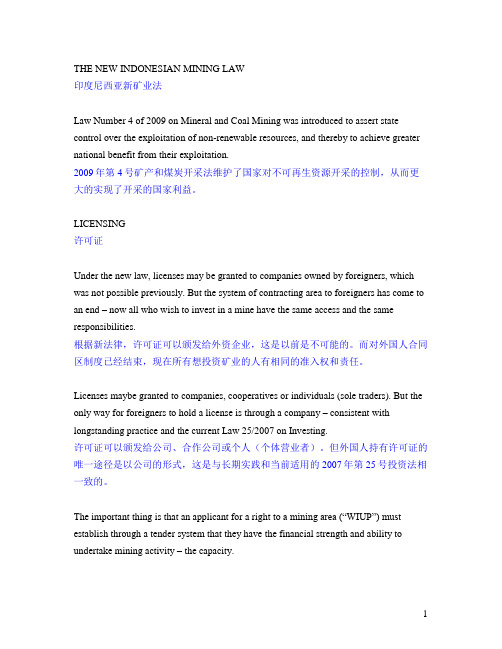
THE NEW INDONESIAN MINING LAW印度尼西亚新矿业法Law Number 4 of 2009 on Mineral and Coal Mining was introduced to assert state control over the exploitation of non-renewable resources, and thereby to achieve greater national benefit from their exploitation.2009年第4号矿产和煤炭开采法维护了国家对不可再生资源开采的控制,从而更大的实现了开采的国家利益。
LICENSING许可证Under the new law, licenses may be granted to companies owned by foreigners, which was not possible previously. But the system of contracting area to foreigners has come to an end – now all who wish to invest in a mine have the same access and the same responsibilities.根据新法律,许可证可以颁发给外资企业,这是以前是不可能的。
而对外国人合同区制度已经结束,现在所有想投资矿业的人有相同的准入权和责任。
Licenses maybe granted to companies, cooperatives or individuals (sole traders). But the only way for foreigners to hold a license is through a company – consistent with longstanding practice and the current Law 25/2007 on Investing.许可证可以颁发给公司、合作公司或个人(个体营业者)。
Environmental protection laws(保护环境的法律 全英文)
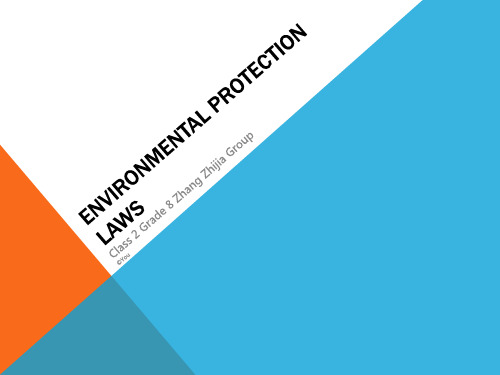
CHINA'S MAIN ENVIRONMENTAL LAWS AND REGULATIONS
The People's Republic of China Marine Environment Protection Law: • • • Supervision and management of the marine environment; Marine ecology protection provisions; Prevent land pollution sources, coastal construction projects, marine construction, dumping of waste, shipping and related activities on the marine environment pollution damage
CHINA'S MAIN ENVIRONMENTAL LAWS AND REGULATIONS
The People's Republic of China Law on radioactive pollution prevention and control: • • • • • Supervision and control of radioactive pollution; Nuclear facility radioactive pollution prevention and control; Nuclear technology using radioactive pollution prevention and control; Exploitation and utilization of uranium deposits and mines associated with radioactivity radioactive pollution prevention and control; Radioactive waste management;
印尼法规惯例(一)
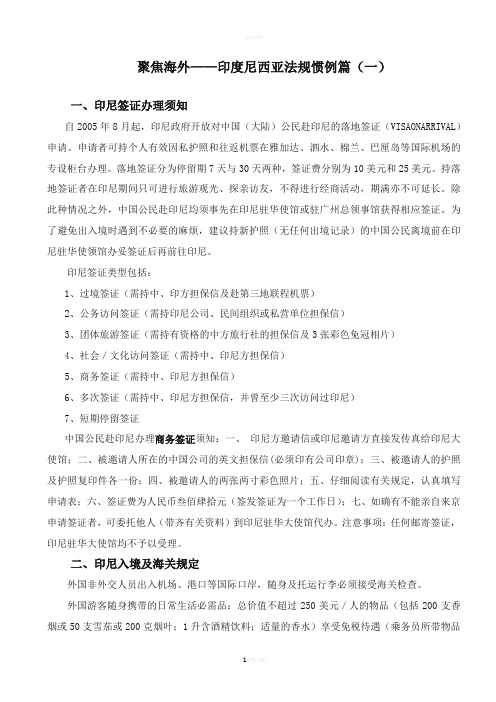
聚焦海外——印度尼西亚法规惯例篇(一)一、印尼签证办理须知自2005年8月起,印尼政府开放对中国(大陆)公民赴印尼的落地签证(VISAONARRIVAL)申请。
申请者可持个人有效因私护照和往返机票在雅加达、泗水、棉兰、巴厘岛等国际机场的专设柜台办理。
落地签证分为停留期7天与30天两种,签证费分别为10美元和25美元。
持落地签证者在印尼期间只可进行旅游观光、探亲访友,不得进行经商活动,期满亦不可延长。
除此种情况之外,中国公民赴印尼均须事先在印尼驻华使馆或驻广州总领事馆获得相应签证。
为了避免出入境时遇到不必要的麻烦,建议持新护照(无任何出境记录)的中国公民离境前在印尼驻华使领馆办妥签证后再前往印尼。
印尼签证类型包括:1、过境签证(需持中、印方担保信及赴第三地联程机票)2、公务访问签证(需持印尼公司、民间组织或私营单位担保信)3、团体旅游签证(需持有资格的中方旅行社的担保信及3张彩色免冠相片)4、社会/文化访问签证(需持中、印尼方担保信)5、商务签证(需持中、印尼方担保信)6、多次签证(需持中、印尼方担保信,并曾至少三次访问过印尼)7、短期停留签证中国公民赴印尼办理商务签证须知:一、印尼方邀请信或印尼邀请方直接发传真给印尼大使馆;二、被邀请人所在的中国公司的英文担保信(必须印有公司印章);三、被邀请人的护照及护照复印件各一份;四、被邀请人的两张两寸彩色照片;五、仔细阅读有关规定,认真填写申请表;六、签证费为人民币叁佰肆拾元(签发签证为一个工作日);七、如确有不能亲自来京申请签证者,可委托他人(带齐有关资料)到印尼驻华大使馆代办。
注意事项:任何邮寄签证,印尼驻华大使馆均不予以受理。
二、印尼入境及海关规定外国非外交人员出入机场、港口等国际口岸,随身及托运行李必须接受海关检查。
外国游客随身携带的日常生活必需品:总价值不超过250美元/人的物品(包括200支香烟或50支雪茄或200克烟叶;1升含酒精饮料;适量的香水)享受免税待遇(乘务员所带物品总价值不超过50美元/人),外国游客自用的照相机、摄像机、卡带式录音机、望远镜、运动器械、笔记本电脑、手机或其它类似设备需申报,离境时须带回。
印度尼西亚环保措施

印度尼西亚环保措施印度尼西亚是一个以自然环境为主要资源的国家,但由于工业化的加快和人口增长,其环境问题已经成为了一件难以回避的问题。
为了改善和保护自然环境,印度尼西亚政府制定了一系列的环保措施。
国家法规制度为了保护环境,印度尼西亚政府制定了一系列环境保护法律,其中最重要的是《环境管理法》。
该法律规定了污染物排放的标准和环境保护的要求,对环境犯罪者进行处罚。
此外,印度尼西亚还颁布了其他相关法律,如《自然资源保护法》、《森林保护法》等。
环境监测与污染治理印度尼西亚政府设立了环境监测系统,建立了定期的环境报告制度。
政府还致力于治理环境污染,建设了若干废水处理厂、垃圾填埋场等环保设施。
此外,印度尼西亚在城市地区启动了一项名为“清洁城市计划”的行动,这是一项全面的城市环境改善计划,旨在解决城市环境中存在的问题。
绿色能源和可再生能源由于印度尼西亚是一个高度依赖化石燃料的国家,为了减少对环境的影响,印度尼西亚政府着眼于开发绿色能源和可再生能源。
政府建立了法规和政策,鼓励私人和公共机构使用太阳能、风能、水能等可再生能源。
生态旅游印度尼西亚的自然环境得天独厚,政府致力于保护这些自然资源并鼓励发展生态旅游业。
政府加强对旅游业的规范,限制对敏感自然环境的影响。
政府还建设和维护生态旅游基础设施和保护设施等。
人口控制印度尼西亚是世界上人口增长最快的国家之一,为了缓解人口对环境造成的负面影响,印度尼西亚改革人口政策,推广计划生育,并且通过宣传普及教育和改善女性的地位和社会利益来推动人口控制。
总结印度尼西亚政府正在采取一系列的环保措施,以保护自然环境和人类健康。
但问题仍然存在,如物质浪费、生态破坏等问题,需要全社会的努力和行动,只有共同努力才能达到环境保护的目标。
国外生物安全法律法规
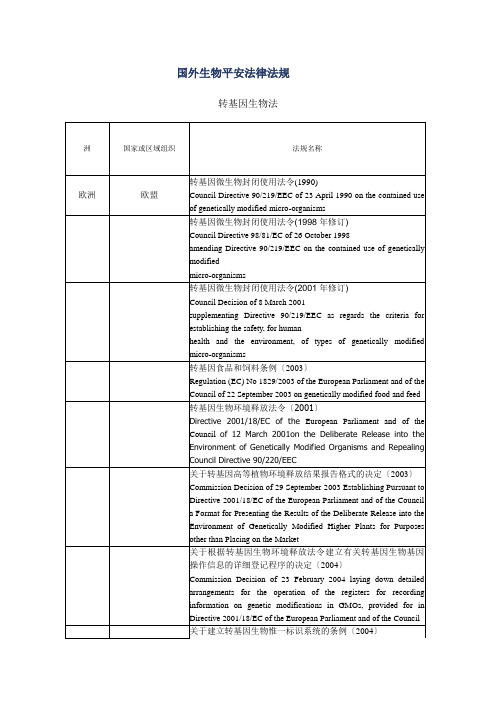
Act of January 22, 2004 on the use of genetically modified organisms and genetic products
爱尔兰
转基因生物封闭使用条例
Genetically Modified Organisms (Contained Use) Regulations (2001)
古巴
生物平安法
Decree Law No. 190 of Biological Safety
墨西哥
墨西哥生物平安法
转基因生物越境转移条例〔2003〕
Regulation (EC) No 1946/2003 of the European Parliament and of the Council of 15 July 2003 on Transboundary Movements of Genetically Modified Organisms
有害生物控制产品法
Pest Control Products Act
植物保护法
Plant Protection Act
种子法
Seeds Regulations
由生物技术开发的兽用生物制品条例
Guidelines for the Regulation of Veterinary Biologics produced by Biotechnology
新异植物及其产品进口许可要求
Import Permit Requirements for Plants With Novel Traits (Including Transgenic Plants), and Their Products
印尼投资及制药行业法律法规政策概要

印尼投资及制药行业法律法规政策概要印尼办事处前言:印尼实施立法、司法和行政三权分立,法律制度以罗马—荷兰法为基础,与当地习惯法和伊斯兰法相融合,属于大陆法系。
《“四五”宪法》(1945 Constitution (Undang—Undang Dasar 1945))、人协决议(MPR Resolution (Ketetapan MPR)、国会法律(Law (Undang—undang)、政府法令(Government Regulation Substituting a Law (Peraturan Pemerintah Pengganti Undang—undang))、政府规章(Government Regulation (Peraturan Pemerintah))、总统令(Presidential Decree (Keputusan Presiden))、地方规章(Regional Regulation (Peraturan Daerah))等共同构成其法律体系.印尼法律体系纷繁复杂,法律条例和司法判例浩如烟海.为便于快速、全面掌握印尼投资及制药行业法律法规政策,本概要通过问题导向以问答形式简要提炼其中的重点,希望有助于整体了解相关的法律和政策要求。
概要中也简单介绍了印尼三有公司和云南滇虹药业曾开展的设立合资公司的部分信息,仅做参考,该项目后因拜尔收购滇虹后终止。
第一、外资投资主管的政府部门及对外商投资项目的管理方式是?涉及的法律有哪些?符合其政策要求的投资项目审批过程大致是?一、印度尼西亚外资投资主管部门是投资协调委员会(或投资统筹机构),Badan Koordinasi Penanaman Modal,简称BKPM,是印尼经济统筹部属下政府机构.它属于印尼政府的官方机构,负责引进、协调和审批全印尼的海外投资项目。
目前印尼政府对投资的管理通过投资清单管理的形式实现,即政府分别制定《鼓励类投资项目清单》、《限制类投资项目清单》、《负面投资(不得投资)类项目清单》。
印尼法律须知

印尼投资贸易法律法规概要第一部分印尼法律环境概述 (2)第二部分印尼设立内资企业外商投资企业的相关法律政策 (3)一、投资主管机构 (3)二、设立内资企业和外资企业的程序 (4)三、关于申请人批准有限责任公司章程的步骤 (6)四、关于申请纳税人注册号 (7)五、海关的批准步骤 (7)六、限制进口许可证(APIT)的批准步骤 (8)七、公司所在地的批准步骤 (8)八、工程施工准字的批准步骤 (8)九、土地所有权的批准步骤 (9)十、损害许可准字的批准步骤 (9)十一、永久经营许可证的批准步骤 (9)十二、投资计划变动的批准程序 (10)第三部分印尼内外资企业的优惠政策 (11)一、进口税务 (11)二、税收 (11)三、产品出口 (11)四、保税区 (11)五、综合经济发展区(KAPET) (12)第四部分印尼国内纠纷解决制度 (12)一、司法程序 (12)二、仲裁和备选纠纷解决(ADR)制度 (13)三、劳动争议解决程序 (15)第五部分印尼投资相关法律解读 (18)一、解读印度尼西亚之新《矿产和煤炭矿业法》 (18)三、印尼税法概述 (24)一、外资有限公司(PTPMA)和常设机构(PE) (24)二、印尼的主要税种简介 (25)三、需要注意的几点: (27)四、印尼2003年劳动法部分规定 (27)一、印尼劳动法简介 (27)二、个别释意: (36)第五部分印尼贸易投资注意事项 (38)一、适应法律环境的复杂性 (38)二、做好企业注册的充分准备 (38)三、适当调整优惠政策期望值 (38)四、充分核算税赋成本 (38)五、有效控制工资成本 (38)六、贸易方面 (39)七、注意合作伙伴和中介问题 (39)八、其他注意事项 (39)第一部分印尼法律环境概述印尼的法律和法律制度的发展深受欧洲大陆法系特别是荷兰法律的影响,但印尼没有建立统一的法律体系,其法律文化呈现多元化的特点。
法律渊源主要包括习惯法、伊斯兰教法和荷兰殖民时期的法律和法令以及独立以后印尼制定的法律法规。
印尼环境标准
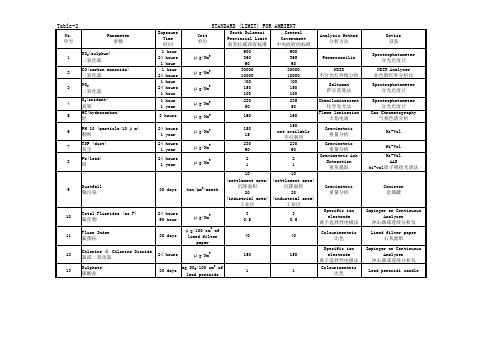
9
Dustfall 镍污染
30 days
ton/km2/month
10 10 (settlement area) (settlement area) 沉降面积 沉降面积 20 20 (industrial area) (industrial area) 工业区 工业区 3 0.5 40 3 0.5 4 5 6 7 8 Parameter 参数 SO2(sulphur) 二氧化硫 CO(carbon monoxide) 一氧化氮 NO2 二氧化氮 O3(oxidant) 臭氧 HC(hydrocarbon) 烃 PM 10 (particle<10 μ m) 颗粒 TSP (dust) 灰尘 Pb(lead) 铅 Exposure Time 时间 1 hour 24 hours 1 hour 1 hour 24 hours 1 hour 24 hours 1 hour 1 hour 1 year 3 hours 24 hours 1 year 24 hours 1 year 24 hours 1 year Unit 单位 μ g/Nm3 μ g/Nm3 μ g/Nm3 μ g/Nm3 μ g/Nm3 μ g/Nm3 μ g/Nm3 μ g/Nm3
11
12 13
24 hours 30 days
150 1
150 1
Specific ion electrode 离子选择性电极法 Colourimentric 比色 Specific ion electrode 离子选择性电极法 Colourimentric 比色
Impinger or Continuous Analyzer 冲击器或连续分析仪 Limed filter paper 石灰滤纸 Impinger or Continuous Analyzer 冲击器或连续分析仪 Lead peroxidi candle
印尼环境保护法

The Law Regarding Environmental ManagementCHAPTER I GENERAL PROVISIONSArticle 1In this Law what is meant by:The environment is the spatial unity of all materials, forces, situations, and living creatures, including humans and their behaviour, which influences the continuance of the life and welfare of humans and other living creatures; Environmental management is an integrated effort to preserve enviornmentalfunctions which covers planning policy, exploitation, development, maintenance, reparation, supervision and control of the environment;Environmentally sustainable development is a conscious and planned effort, which integrates the environment, including resources, into the development process to ensure capability, welfare, and quality of life of present and future generations;An ecosystem is on ordering of an element of the environment which constitutes a whole and complete unit which interacts to produce environmental balance, stability, and productivity;Preservation of environmental functions is a set of efforts to maintain the continued supportive and carrying capacities of the environment; Environmental supportive capacity is the capacity of the environment to support humans and other living creatures;Preservation of environmental support capacity is a set of efforts to protect environmental viability against pressures for change and/or negative impacts that arise because of an activity, so that it can continue to support the life of humans and other living creatures;Environmental carrying capacity is the capability of the environment to absorb substances, energy, and/or other components that enter or are discharged into it;Preservation of environmental carrying capacity is a set of efforts to protect the capability of the environment to absorb substances, energy, and/or other components which are discharged into it;Resources are environmental elements that consist of human resources, natural resources, biological as well as non-biological, and artificial resources; Environmental quality standards are the threshold limits or levels of living creatures, substances, energy, or components that exists or must exist and/or pollutanting elements the existence of which in a certain resource as an element of the environment is set at a certain level;Environmental pollution is the entry or the entering into of living creatures, substances, energy, and/or other components into the environment by humanactivities with the result that its quality decreases to a certain level which causes the environment not to be able to function in accordance with its allocation;Standard environmental damage criteria are threshold limits of physical and/or biological changes in the environment which can be measured; Environmental damage is an action which gives rise to direct or indirect changes in the physical and/or biological characteristics of the environment which causes the environment to no longer be able to function to support sustainable development;Conservation of natural resources is the management of non-renewable natural resources to ensure their prudent utilization, and renewable resources to ensure their continued availability through maintaining and improving quality levels and diversity;Waste is the residue of a business and/or activity;Hazardous and toxic material is every matter which due to its nature or concentration, both directly and indirectly, can pollute and/or damage the environment, health, the continuation of human life and of other living creatures;Hazardous and toxic waste is the residue of a business and/or activity that contains hazardous and/or toxic material which due to its nature and/or concentration and/or amount, directly as well as indirectly, can polluteand/or damage the environment, and/or endanger the environment, health, the continuation of human life and of other living creatures;An environmental dispute is a disagreement between two or more parties which is arises as a result of the existence of or suspected existence of environmental pollution and/or damage;Environmental impact is the influence for change on the environment which is caused by a business and/or an activity;Environmental impact analysis is a study of large and significant impacts of a planned business and/or activity which is needed in the decision making process regarding business and/or activity implementation;An environmental organization is a group of persons formed of their own volition and desire in the midst of the community, with its objectives and activities in the environmental field;An environmental audit is an evaluation process performed by those responsible for a business and/or activity to assess the level of compliance with applicable legal conditions and/or policy and standard set by the party responsible for the business and/or activity concerned;A person is an individual person, and/or a group of people, and/or legal body; Minister is the Minister whohas been given the task of managing the environment.Article 2The scope of the Indonesian environment covers space, the location of the United Indonesian State with an Archipelagic Outlook in performing itssovereignty, sovereign rights, and jurisdiction.CHAPTER II BASIS, OBJECTIVE, AND TARGETArticle 3Environmental management which is performed with a principle of national responsibility, a principle of sustainability, and a principle of exploitation, aims to create environmentaly sustainable development in the framework of the holistic development of the Indonesian human and the development of an Indonesian community in its entirety which is faithful and devoted to God the Almighty.Article 4The targets of environmental management are:achievement of harmony and balance between humans and the environment; formation of the Indonesian person as an environmental being disposed toward and acting to protect and foster the environment;guaranteeing the interests of present generations and future generations; achievement of preservation of environmental functions;prudent control of the exploitation of resources;protection of the Unitary Indonesia Republic against impacts of businessand/or activity outside the national region which causes environmental pollution and/or damage.CHAPTER III COMMUNITY RIGHTS, OBLIGATIONS AND ROLEArticle 51. Every person has the same right to an environment which is good and healthy.2. Every person has the right to environmental information which is related to environmental management roles.3. Every person has the right to play a role in the scheme of environmental management in accordance with applicable laws and regulations.Article 61. Every person is obliged to preserve the continuity of environmental functions and protect and combat environmental pollution and damage.2. Every person who carrying out a business or other activity must providetrue and accurate information regarding environmental management.Article 71. The community has the same and the broadest possible opportunity to play a role in environmental management.2. Implementation of the stipulation in (1) above, is carried out by:increasing independence, community empowerment, and partnershipgiving growth to community capability and initiative;increasing community responsiveness in carrying out social supervision; providing suggestions;conveying information and/or conveying reports.CHAPTER IV ENVIRONMENTAL MANAGEMENT AUTHORITYArticle 81. Natural resources are controlled by the state and are utilized for the greatest possible public welfare, and the arrangements thereof are determined by the Government.2. To implement the stipulation provided for in (1) above the Government:regulates and develops policy in the scheme of environmental management; regulates the supply, allocation, use, [and] management of the environment, and the reuse of natural resources, including genetic resources;regulates legal actions and legal relations between persons and/or other legal subjects as well as legal actions regarding natural resources and artificial resources, including genetic resources;controls activities which have social impact;develops a funding system for efforts to preserve environmental functions. 3. The stipulations provided for in (2) above are further regulated by Government Regulation.Article 91. The Government determines national policies on environmental management and spatial management whilst always taking into account religious values, culture and traditions and the living norms of the community.2. Environmental management is performed in an integrated manner by government institutions in accordance with their respective fields of tasks and responsibilities, the public, and other agents of development while taking into account the integratedness of planning and implementation of the environmental management policy.3. Environmental management must be performed in an integrated manner with spatial management, protection of non-biological natural resources, protection of artificial resources, conservation of biological natural resources and their ecosystems, cultural preservation, bio-diversity and climate change.4. The integratedness of planning and implementation of national environmental management policy, as provided for in (2) above, is coordinated by the Minister.Article 10In the scheme of environmental management the Government must:form, give growth to, develop and increase awareness and responsibility of decision makers environmental management;form, give growth to, develop and increase awareness of community rights and responsibilities in environmental management;form, give growth to, develop and increase partnership between the community, business and the Government in the effort to preserve environmental supportive capacity and carrying capacity;develop and apply environmental management policy which ensures the maintaining of environmental supportive and carrying capacity;develop and apply instruments of a pre-emptive, preventive and proactive nature in the effort to prevent decreases in environmental supportive and carrying capacity;exploit and develop environmentally sound technology;carry out research and development in the environmental field;provide environmental information and disseminate it to the community;give awards to meritorious people or foundations in the environmental field. Article 111. Environmental management at the national level is implemented integratedly by an institutional instrument which is coordinated by the Minister.2. Stipulations on task, function, authority, and organizational arrangement as well as institutional working procedures as provided for in (1) above are regulated further by Presidential Decision.Article 121. Te create integratedness and harmony in the implementation of national policy regarding environmental management, the Government based on legislation can:delegate certain environmental management authority to local CentralGovernment offices;give a role to Local Government to assist the Central Government in the implementation of environmental management in the regions.2. Further stipulations as provided for in (1) above are regulated by laws and regulations.Article 131. In the scheme of the implementation of environmental management, the Government can transfer part of its affairs to Local Government to become part of its general affairs.2. Transferring of affairs as provided for (1) above is determined by Government Regulation.CHAPTER V PRESERVATION OF ENVIRONMENTAL FUNCTIONSArticle 141. To guarantee the preservation of environmental functions, every business and/or activity is prohibited from breaching quality standards and standard criteria of environmental damage.2. Stipulations on environmental quality standards, prevention of and coping with pollution and restoration of its carrying capacity are regulated by Government Regulation.3. Stipulations on standard criteria of environmental damage, prevention and coping with damage along with restoration of its supportive capacity are regulated by Government Regulation.Article 151. Every plan of a business and/or activity with the possibility that it can give rise to large and important impact on the environment, must possess an environmental impact analysis.2. Stipulations concering business and/or activity plans that give ries to a large and mportant impact on the environment, as is meant in (1) above, and the method for arrangement and evaluation of environmental impact analysis are determined by Government Regulation.Article 161. Every party responsible for a business and/or activity must carry out management of wastes produced by their business and/or activity.2. The responsible party for a business and/or activity as provided for in (1) above can transfer such waste management to another party.3. Stipulations on the implementation of this article are regulated further by Government Regulation.Article 171. Every party responsible for a business and/or activity must carry out management of the hazardous and toxic materials.2. Management of hazardous and toxic materials covers: producing, transporting, distributing, storing, using and/or disposing.3. Stipulations concerning management of hazardous and toxic materials are regulated further by Government Regulation.CHAPTER VI ENVIRONMENTAL COMPLIANCE REQUIREMENTSPart I LicensingArticle 181. Every business and/or activity which gives rise to a large and important impact on the environment must possess an environmental impact analysis to obtain the license to conduct a business and/or activity.2. The license to conduct a business and/or activity as provided for in (1) above is conferred by the official who has authority in accordance with laws and regulations.3. In the license provided for in (1) above is included conditions and obligations to carry out environmental impact control efforts.Article 191. In issuing a license to carry out a business and/or activity it is compulsoy to take into account:spatial management plans;public opinion;considerations and recommendations of authorized officials who are involved with such business and/or activity.2. The license to conduct a business and/or activity decision must be made public.Article 201. Without a licensing decision, every person is prohibitted from disposing of waste to an environmental medium.2. Every person is prohibited from disposing of waste which originates from outside Indonesian territory to an Indonesian environmental medium.3. The authority to issue or refuse a licensing application as provided for in (1) above lies with the Minister.4. Waste disposal to an environmental medium as provided for in (1) above may only be carried out at a disposal site which is determined by the Minister.5. Implementing provisions for this Article are regulated further by government regulation.Article 21Every person is prohibitted from importing hazardous and toxic wastes.Part II SupervisionArticle 221. The Minister carries out supervision of the compliance of those responsible for a business and/or activity to stipulations which have already been applied in the laws and regulations in the environmental field.2. To carry out the supervision provided for in (1) above, the Minister can appoint officials with authority to carry out supervision.3. Where supervisory authority is transferred to Local Government, the Regional Head appoints officials authorized to carru out supervision.Article 23Environmental impact control as a supervisory instrument is carried out by an institution formed especiallly for that by the Government.Article 241. To implement its task, the supervisor provided for in Article 22 has authority to conduct monitoring, request an explanation, make copies of documents and/or make notes which are needed, enter certain places, take samples, inspect equipment, inspect installations and/or transportation equipment, and request an explanation from the party responsible for abusiness and/or activity.2. The party responsible for a business and/or activity which has been requested to provide an explanation as provided for in (1) above, must fulfill the request of the supervisor official in accordance with stipulations of applicable laws and regulations.3. Each supervisor must show a letter of instruction and/or proof of identity and must be attentive to the situation and conditions prevailing at such place of supervision.Part III Administrative SanctionsArticle 251. The Governor/Head of the Level I Region has the authority to carry out administrative sanctions against the party responsible for a business and/or activity to prevent and end occurance of an infringement, and to deal with the consequences given rise to by an infringement, carry out safeguarding, mitigating and/or remedial measures at the expense of the party responsible for a business and/or activity, except where otherwise stipulated based on Law.2. Authority as provided by (1) above, can be transferred to the District Head/Major/Head of the Level II Region by Level I Region Regulation.3. A third party who has an interest has the right to submit an application to the authorised official to carry out an administrative sanction, as provided for in (1) and (2) above.4. Administrative sanctions as provided for in (1) and (2) above, are preceded by an order from the authorized official.5. Safeguarding, mitigating and/or remedial measures as provided for in (1) above can be replaced with the payment of a certain sum of money.Article 261. The procedure for determining expenses as provided for in Article 25(1) and (5) above and their retribution is determined by laws and regulations.2. Where laws and regulations as provided for in (1) above are not yet formed, its implementation uses legal efforts according to applicable laws and regulations.Article 271. Sanctions in the form of revocation of business and/or activity licenses can be imposed upon certain infringements.2. The Regional Head can submit a proposal for the revoking of a business and/or activity license to an authorized official.3. A party which has an interest can submit an application to the authorized official to revoke a business and/or other activity license because their interests are adversely affected.Part IV Environmental AuditsArticle 28In the scheme of improving business and/or activity performance, the Government ennourages the party responsible for a business and/or activity to conduct an environmental audit.Article 291. The Minister has the authority to order the party responsible for a business and/or activity to conduct an environmental audit if the party concerned indicates their non-compliance with stipulations arranged in this law.2. The party responsible for a business and/or activity which is ordered to conduct an environmental audit must execute the order as provided for in (1) above.3. If the person responsible for a business and/or activity does not execute the order as provided for in (1) above, the Minister can execute or instruct a third party to execute an environmental audit as provided for in (1) above, at the expense of the party resonsible for the business and/or activity concerned.4. The total expense as provided for in (3) above is determined by the Minister.5. The Minister publicises the results of an environmental audit provided for in (1).CHAPTER VII ENVIRONMENTAL DISPUTE SETTLEMENTPart I GeneralArticle 301. Environmental dispute settlement can be reached through the court or out ofcourt based on the voluntary choice of the parties in dispute.2. Out of court dispute settlement as provided for in (1) above does not apply to criminal environmental actions as regulated in this law.3. If an out of court dispute settlement has already been chosen, legal action through the court can only be undertaken if such effort is declared to have not succeeded by one or several of the parties in dispute.Part II Out of Court Environmental Dispute SettlementArticle 31Out of court environmental dispute settlement is held to reach agreement on the form and size of compensation and/or on certain actions to ensure that negative impacts on the environment will not occur or be repeated.Article 32In out of court environmental dispute settlement as provided for in Article 31 the services of the third party can be used, both which do not possess decision making authority and which possess decision making authority, to help resolve an environmental dispute.Article 331. The Government and/or community can form environmental dispute settlement service providing agency which has a free and impartial disposition.2. Stipulations on an environmental dispute settlement service provider are regulated further by Government Regulation.Part III Environmental Dispute Settlement Through the CourtParagraph I CompensationArticle 341. Every action which infringes the law in the form of environmental pollution and/or damage which gives rise to adverse impacts on other people or the environment, obliges the party responsible for the business and/or activity to pay compensation and/or to carry out certain actions.2. As well as the burden of carrying out certain participatory actions provided for in (1) above, the judge can determine complusory monetary payment to be made for every day of lateness in completion of such certain actions. Paragraph II Strict LiabilityArticle 351. The party responsible for a business and/or activity whch gives rise to a large impact on the environment, which uses hazardous and toxic materials, and/or produces hazardous and toxic waste, is strictly liable for losses which are given rise to, with the obligation to pay compensation directly and immediately upon occurence of environmental pollution and/or damage.2. The party responsible for a business and/or activity can be released from the obligation to pay compensation provided for in (1) above if those concerned can prove that environmental pollution and/or damage was caused by one of the following reasons:the existence of a natural disaster or war; orthe existence of situation of coercion outside of human capabilities; orthe existence of actions of a third party which caused the occurence of environmental pollution and/or damage.3. Where losses occur which have been caused by a third party as provided for in (2)(c) above, the third party is responsible for paying compensation. Paragraph III Time Limits for Bringing Legal ActionsArticle 361. The limitation period for bringing legal actions to court follows the periods set out in the applicable Civil Procedures Law, and is calculated from the moment the victim knows of the existence of environmental pollution and/or damage.2. Stipulations on the limitation period for bringing legal actions as provided for in (1) above do not apply to environmental pollution and/or damage which is caused by a business and/or activity which uses hazardous and toxic materials and/or produces hazardous and toxic waste.Paragraph 4 Right of the Community and Environmental Organization to Bring Legal ActionsArticle 371. The community has the right to bring a class action to court and/or report to law enforcers concerning various environmental problems which inflict losses on the life of the community.2. If it is known that the community suffers as a result of environmental pollution and/or damage to such n extent that it influences the basic life ofthe community, the governmental agency which is responsible in the environmental field can act in the community's interest.3. Further stipulations as to what is intended by (2) above are regulated by Government Regulation.Article 381. In the scheme of implementing responsibility for environmental management consistent with a partnership principle, environmental organizations have the right to bring a legal action in the interest of environmental functions.2. The right to bring a legal action as provided for in (1) above is limited to a demand for a right to carry out particular measures without the presence of a demand for compensation, except for expenses or real outlays.3. Environmental organizations have the right to bring a legal action as provided in (1) above if they meet the following conditions:they have the form of a legal body or foundation;in the articles of association of the environmental organization it is stated clearly that the goal of the founding of the organisation concerned was in the interests of the preservation of environmental functions;activities consistent with its articles of association have already been carried out.Article 39Procedures for the submission of legal actions in environmental problems by individuals, the community, and/or environmental organisations refers to the applicable Civil Procedures Law.CHAPTER VIII INVESTIGATIONArticle 401. As well as Republic of Indonesia National Police Investigators, certain Civil Government Officials asociated with the government agency whose scope of functions and responsibility are in the environmental management field, are given special authority as investigators as is provided for in Laws appropriate with applicable Criminal Procedures Law.2. Civil Investigator Officers as provided for in (1) above have the authority to:carry out examination of the correctness of a report or explanation in relation to a criminal action in the environmental area;carry out examination of people or legal bodies who are suspected of criminalactions in the environmental field;request an explanation and evidence from individuals or legal bodies in relation to a criminal incident in the environmental field;carry out examination of account-keeping, notes and other documents which are relevant to a criminal action in the environmental field;carry out examination at certain places which are suspected of containing evidence, accounts, notes, and other documents along with carrying out confiscation of materials resulting from infringements which can be used as evidence in criminal cases in the environmental field;request expers assistance in the scheme of the implementation of the function of investigation of criminal actions in the environmental field.3. Civil Investigator Officers provided for in (1) above inform the Republic of Indonesia National Police Investigators of the commencement and the results of their investigation.4. Civil Investigator Officers provided for in (1) above convey the findings of investigation to the Public Prosecutor through Republic of Indonesia National Police Investigators.5. Investigation of environmental crimes in Indonesian waters and the Exclusive Economic Zone is carried out by investigators according to applicable laws and regulations.CHAPTER IX CRIMINAL PROVISIONSArticle 411. Any person who in contravention of the law intentionally carries out an action which results in environmental pollution and/or damage, is criminally liable to a maximum imprisonment of 10 (ten) years and a maximum fine of Rp.500,000,000 (five hundred million rupiah).2. If a criminal action as provided for in (1) above causes the death or serious injury of a person, the person who carried out the criminal action is criminally liable to a maximum imprisonment of 15 (fifteen) years and a maximum fine of Rp.750,000,000 (seven hundred and fifty million rupiah). Article 421. Any person who due to their negligence performs an action that causes environmental pollution and/or damage, is criminally liable to a maximum imprisonment of three years and a maximum fine of Rp.100,000,000 (one hundred million rupiah).2. If a criminal action as provided for in (1) above causes the death or serious injury of a person, the person who carried out the criminal action is。
印度尼西亚政策法规

印度尼西亚一、双边贸易投资概况2006 年东盟是中国第五大贸易伙伴。
据中国海关统计,2006 年中国和东盟双边贸易总额为1608.4 亿美元。
其中,中国和印度尼西亚双边贸易总额为190.6亿美元,同比增长13.5%。
其中,中国对印尼出口94.5 亿美元,同比增长13.2%;自印尼进口96.1 亿美元,同比增长13.9%。
中方逆差1.6亿美元。
中国对印尼出口的主要产品为除原油外的从石油或沥青中提取的油类及其制品,钢铁,机器、机械、电机、电气、音像设备及其零件,车辆及其零部件,化工产品,棉布、纤维等纺织原料,葱类蔬菜,苹果、梨等,自印尼进口的主要产品为从石油或沥青中提取的原油、油类及其制品,煤及其他矿产品,电子设备及组件,电机、电器设备及零部件,有机化工品,橡胶,木及木制品,纸及纸板,棕榈油及其分离品等。
据中国商务部统计,截至2006 年底,中国公司在印尼累计完成承包工程营业额20.6 亿美元;累计完成劳务合作合同金额2.5 亿美元。
据中国商务部统计,2006 年经中国商务部批准备案,中国对印尼非金融类对外直接投资额为3588 万美元。
据中国商务部统计,2006年印尼对中国投资项目115 个;合同金额4.7 亿美元;实际使用金额1.0 亿美元。
二、贸易投资管理体制概述印尼与贸易投资有关的法律主要包括《1934 年贸易法》、《海关法》、《建立世界贸易组织法》、《产业法》。
与贸易相关的其他法律还涉及《国库法》、《禁止垄断行为和不正当贸易竞争法》、《外国投资法》和《国内投资法》等。
(一)贸易管理制度及其发展1. 关税制度印尼对大部分进口产品征收从价税,但对大米和糖类等产品征收从量税。
印尼进口产品的关税分为一般税率和优惠税率两种。
根据《中国—东盟全面经济合作框架协议货物贸易协议》,2007 年起对自中国进口的产品关税将降至8%。
2009年起自最惠国进口产品的税率由5%降为0。
2010 年前中国与印尼将逐步削减关税,将对绝大多数产品实行零关税。
环境法律法规清单(中英文)
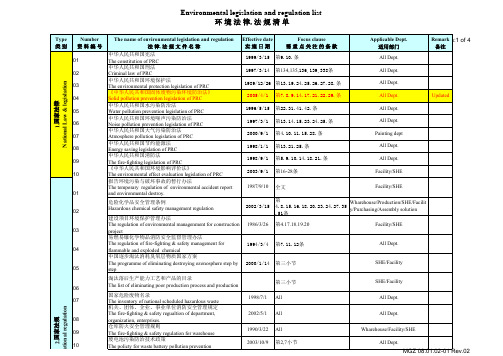
The environmental effect evaluation regulation for special
2003/10/8 All
programming 排污费征收使用管理条例
Payment management rule for waste discharge 《危险废物经营许可证管理办法》
05
06 07
08 09 10
The name of environmental legislation and regulation Effective date
法 律, 法 规 文 件 名 称
实施日期
Focus clause 需重点关注的条款
Applicable Dept. 适用部门
中华人民共和国宪法
Type 类别
Number 资料编号
10
11
The name of environmental legislation and regulation 法 律, 法 规 文 件 名 称
广州市固体废弃物污染环境防治条例 Guangzhou city solid waste pollution prevention regulation 广州市<<城市区域环境噪声标准>>适用区域划分 The applicable area distribution for city environmental noise standard in Guangzhou
备注
Updated
淘汰落后生产能力工艺和产品的目录 The list of eliminating poor production process and production
第三小节
SHE/Facility
印度尼西亚政策法规

印度尼西亚一、双边贸易投资概况2006 年东盟是中国第五大贸易伙伴。
据中国海关统计,2006 年中国和东盟双边贸易总额为1608.4 亿美元。
其中,中国和印度尼西亚双边贸易总额为190.6亿美元,同比增长13.5%。
其中,中国对印尼出口94.5 亿美元,同比增长13.2%;自印尼进口96.1 亿美元,同比增长13.9%。
中方逆差1.6亿美元。
中国对印尼出口的主要产品为除原油外的从石油或沥青中提取的油类及其制品,钢铁,机器、机械、电机、电气、音像设备及其零件,车辆及其零部件,化工产品,棉布、纤维等纺织原料,葱类蔬菜,苹果、梨等,自印尼进口的主要产品为从石油或沥青中提取的原油、油类及其制品,煤及其他矿产品,电子设备及组件,电机、电器设备及零部件,有机化工品,橡胶,木及木制品,纸及纸板,棕榈油及其分离品等。
据中国商务部统计,截至2006 年底,中国公司在印尼累计完成承包工程营业额20.6 亿美元;累计完成劳务合作合同金额2.5 亿美元。
据中国商务部统计,2006 年经中国商务部批准备案,中国对印尼非金融类对外直接投资额为3588 万美元。
据中国商务部统计,2006年印尼对中国投资项目115 个;合同金额4.7 亿美元;实际使用金额1.0 亿美元。
二、贸易投资管理体制概述印尼与贸易投资有关的法律主要包括《1934 年贸易法》、《海关法》、《建立世界贸易组织法》、《产业法》。
与贸易相关的其他法律还涉及《国库法》、《禁止垄断行为和不正当贸易竞争法》、《外国投资法》和《国内投资法》等。
(一)贸易管理制度及其发展1. 关税制度印尼对大部分进口产品征收从价税,但对大米和糖类等产品征收从量税。
印尼进口产品的关税分为一般税率和优惠税率两种。
根据《中国—东盟全面经济合作框架协议货物贸易协议》,2007 年起对自中国进口的产品关税将降至8%。
2009年起自最惠国进口产品的税率由5%降为0。
2010 年前中国与印尼将逐步削减关税,将对绝大多数产品实行零关税。
印度尼西亚投资法律规则

印度尼西亚投资法律规则作者:来源:《青年与社会》2016年第18期一、印度尼西亚对中国企业投资合作的保护政策中国与印度尼西亚签署双边投资保护协定;中国与印度尼西亚政府在1994年签署《促进和保护投资协定》;中国与印度尼西亚签署避免双重征税协定;中国与印度尼西亚政府在2001年签署《避免双重征税和防止偷漏税协定》;与投资合作相关的主要法律:《投资法》、《公司法》、《所得税法》、《劳动法》、《知识产权法》、《破产法》、《贸易法》、《海关法》等。
二、对外投资法律法规(一)外国投资的市场准入投资行业1、禁止投资的领域:国内外投资者可自由投资任何营业部门,除非已为法令所限制与禁止。
法令限制与禁止投资的部门包括生产武器、火药、爆炸工具与战争设备及被宣布为禁止投资行业的25个行业,仅能由政府从事经营。
禁止投资的行业包括:毒品种植交易业、受保护鱼类捕捞业、以珊瑚或珊瑚礁制造建筑材料,含酒精饮料工业、水银氯碱业、污染环境的化学工业、生物武器工业,机动车型号和定期检验、海运通讯或支持设施、舰载交通通讯系统、空中导航服务、无线电与卫星轨道电波指挥系统、地磅站,公立博物馆、历史文化遗产和古迹、纪念碑以及赌博业。
2、为促进相关行业发展,放宽外资进人以下领域的条件:①以特别许可证形式允许外资进人过去不对外开放的糖精工业部门。
②在建筑公共工程行业,外资股权比例最高限制由55%提高到67%。
③开放外资进入文化旅游领域中的电影服务业(包括影片工作室、影片处理实验室、配音设备、电影洗印和复制),外资股权比例最高不超过 49%。
④外资在医院服务、专科诊所、临床试验室的股权比例限制由65%提高到67%,对外资的经营地点不再限制,允许外资在印度尼西亚境内开展经营业务。
⑤电力行业,允许外国企业通过合作方式参与开发0.1和1万千瓦的发电项目,对1万千瓦以上的发电项目,外资股权比例不得超过95%。
3、对外资在以下行业领域的股权比例进行了调整:①主要粮食作物(玉米、大豆、花生、绿豆木薯和红薯等)种植面积超过25公顷的,外资股权比例最高不能超过49%。
4we
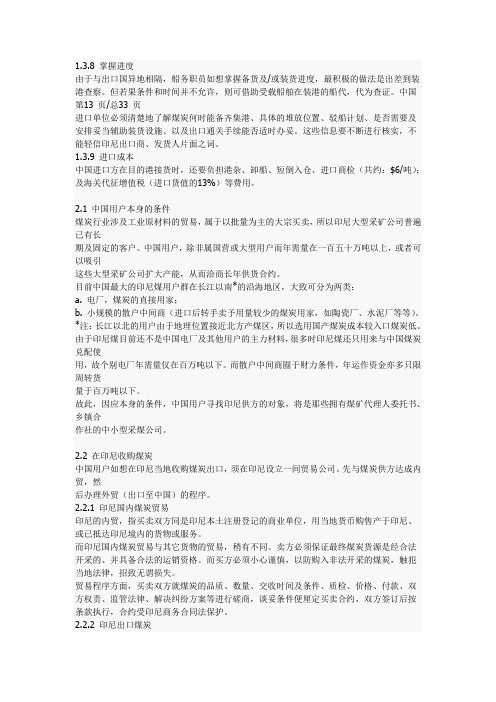
1.3.8 掌握进度由于与出口国异地相隔,船务职员如想掌握备货及/或装货进度,最积极的做法是出差到装港查察。
但若果条件和时间并不允许,则可借助受载船舶在装港的船代,代为查证。
中国第13 页/总33 页进口单位必须清楚地了解煤炭何时能备齐集港、具体的堆放位置、驳船计划、是否需要及安排妥当辅助装货设施、以及出口通关手续能否适时办妥。
这些信息要不断进行核实,不能轻信印尼出口商、发货人片面之词。
1.3.9 进口成本中国进口方在目的港接货时,还要负担港杂、卸船、短倒入仓、进口商检(共约:$6/吨);及海关代征增值税(进口货值的13%)等费用。
2.1 中国用户本身的条件煤炭行业涉及工业原材料的贸易,属于以批量为主的大宗买卖,所以印尼大型采矿公司普遍已有长期及固定的客户。
中国用户,除非属国营或大型用户而年需量在一百五十万吨以上,或者可以吸引这些大型采矿公司扩大产能,从而洽商长年供货合约。
目前中国最大的印尼煤用户群在长江以南*的沿海地区,大致可分为两类:a. 电厂,煤炭的直接用家;b. 小规模的散户中间商(进口后转手卖予用量较少的煤炭用家,如陶瓷厂、水泥厂等等)。
*注:长江以北的用户由于地理位置接近北方产煤区,所以选用国产煤炭成本较入口煤炭低。
由于印尼煤目前还不是中国电厂及其他用户的主力材料,很多时印尼煤还只用来与中国煤炭兑配使用,故个别电厂年需量仅在百万吨以下。
而散户中间商囿于财力条件,年运作资金亦多只限周转货量于百万吨以下。
故此,因应本身的条件,中国用户寻找印尼供方的对象,将是那些拥有煤矿代理人委托书、乡镇合作社的中小型采煤公司。
2.2 在印尼收购煤炭中国用户如想在印尼当地收购煤炭出口,须在印尼设立一间贸易公司。
先与煤炭供方达成内贸,然后办理外贸(出口至中国)的程序。
2.2.1 印尼国内煤炭贸易印尼的内贸,指买卖双方同是印尼本土注册登记的商业单位,用当地货币购售产于印尼、或已抵达印尼境内的货物或服务。
而印尼国内煤炭贸易与其它货物的贸易,稍有不同。
印尼法律须知word版本
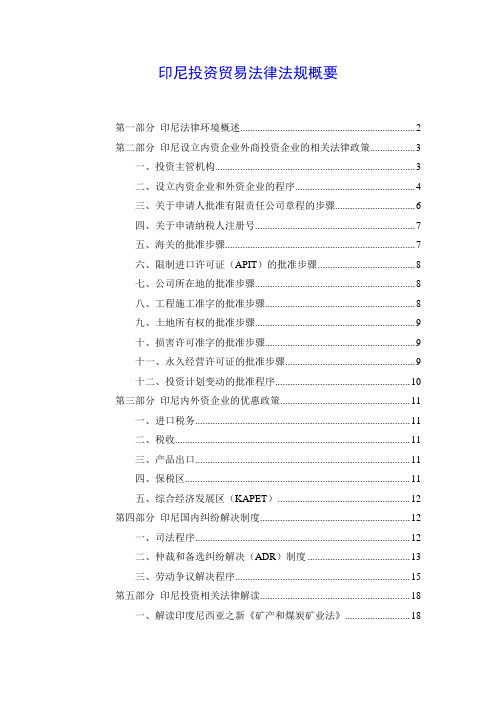
印尼投资贸易法律法规概要第一部分印尼法律环境概述 (2)第二部分印尼设立内资企业外商投资企业的相关法律政策 (3)一、投资主管机构 (3)二、设立内资企业和外资企业的程序 (4)三、关于申请人批准有限责任公司章程的步骤 (6)四、关于申请纳税人注册号 (7)五、海关的批准步骤 (7)六、限制进口许可证(APIT)的批准步骤 (8)七、公司所在地的批准步骤 (8)八、工程施工准字的批准步骤 (8)九、土地所有权的批准步骤 (9)十、损害许可准字的批准步骤 (9)十一、永久经营许可证的批准步骤 (9)十二、投资计划变动的批准程序 (10)第三部分印尼内外资企业的优惠政策 (11)一、进口税务 (11)二、税收 (11)三、产品出口 (11)四、保税区 (11)五、综合经济发展区(KAPET) (12)第四部分印尼国内纠纷解决制度 (12)一、司法程序 (12)二、仲裁和备选纠纷解决(ADR)制度 (13)三、劳动争议解决程序 (15)第五部分印尼投资相关法律解读 (18)一、解读印度尼西亚之新《矿产和煤炭矿业法》 (18)三、印尼税法概述 (24)一、外资有限公司(PTPMA)和常设机构(PE) (24)二、印尼的主要税种简介 (25)三、需要注意的几点: (27)四、印尼2003年劳动法部分规定 (27)一、印尼劳动法简介 (27)二、个别释意: (36)第五部分印尼贸易投资注意事项 (38)一、适应法律环境的复杂性 (38)二、做好企业注册的充分准备 (38)三、适当调整优惠政策期望值 (38)四、充分核算税赋成本 (38)五、有效控制工资成本 (38)六、贸易方面 (39)七、注意合作伙伴和中介问题 (39)八、其他注意事项 (39)第一部分印尼法律环境概述印尼的法律和法律制度的发展深受欧洲大陆法系特别是荷兰法律的影响,但印尼没有建立统一的法律体系,其法律文化呈现多元化的特点。
法律渊源主要包括习惯法、伊斯兰教法和荷兰殖民时期的法律和法令以及独立以后印尼制定的法律法规。
印尼法律制度概论
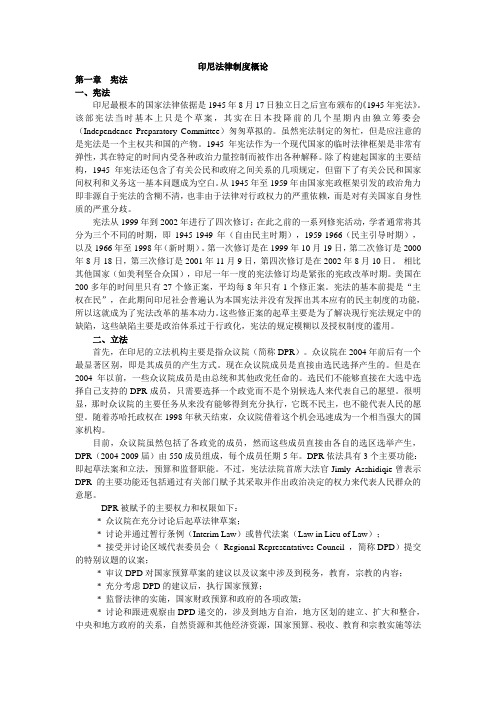
印尼法律制度概论第一章宪法一、宪法印尼最根本的国家法律依据是1945年8月17日独立日之后宣布颁布的《1945年宪法》。
该部宪法当时基本上只是个草案,其实在日本投降前的几个星期内由独立筹委会(Independence Preparatory Committee)匆匆草拟的。
虽然宪法制定的匆忙,但是应注意的是宪法是一个主权共和国的产物。
1945年宪法作为一个现代国家的临时法律框架是非常有弹性,其在特定的时间内受各种政治力量控制而被作出各种解释。
除了构建起国家的主要结构,1945年宪法还包含了有关公民和政府之间关系的几项规定,但留下了有关公民和国家间权利和义务这一基本问题成为空白。
从1945年至1959年由国家宪政框架引发的政治角力即非源自于宪法的含糊不清,也非由于法律对行政权力的严重依赖,而是对有关国家自身性质的严重分歧。
宪法从1999年到2002年进行了四次修订;在此之前的一系列修宪活动,学者通常将其分为三个不同的时期,即1945-1949年(自由民主时期),1959-1966(民主引导时期),以及1966年至1998年(新时期)。
第一次修订是在1999年10月19日,第二次修订是2000年8月18日,第三次修订是2001年11月9日,第四次修订是在2002年8月10日。
相比其他国家(如美利坚合众国),印尼一年一度的宪法修订均是紧张的宪政改革时期。
美国在200多年的时间里只有27个修正案,平均每8年只有1个修正案。
宪法的基本前提是“主权在民”,在此期间印尼社会普遍认为本国宪法并没有发挥出其本应有的民主制度的功能,所以这就成为了宪法改革的基本动力。
这些修正案的起草主要是为了解决现行宪法规定中的缺陷,这些缺陷主要是政治体系过于行政化,宪法的规定模糊以及授权制度的滥用。
二、立法首先,在印尼的立法机构主要是指众议院(简称DPR)。
众议院在2004年前后有一个最显著区别,即是其成员的产生方式。
现在众议院成员是直接由选民选择产生的。
2023年最新整理的环境保护法律法规英文版

2023年最新整理的环境保护法律法规英文版Document Title: Latest Compilation of Environmental Protection Laws and Regulations in 2023In 2023, there have been significant updates and amendments to environmental protection laws and regulations. These changes aim to address the growing concerns regarding environmental degradation and the need for sustainable development. The updated laws and regulations cover a wide range of issues, including air and water pollution, waste management, biodiversity conservation, and climate change mitigation.One of the key highlights of the new laws is the stricter enforcement of emission standards for industries to reduce air pollution. Additionally, there are new regulations in place to promote the use of renewable energy sources and encourage green practices in businesses. Waste management laws have also been updated to promote recycling and reduce the amount of waste sent to landfills.Furthermore, there are new measures to protect biodiversity and endangered species, including stricter penalties for illegal wildlife trade. The government has also introduced initiatives to address climate change, such as setting targets for reducing greenhouse gas emissions and promoting carbon offset programs.Overall, the latest compilation of environmental protection laws and regulations in 2023 reflects a growing awareness of the need to protect the environment and promote sustainable development. It underscores the importance of compliance with environmental laws to ensure a healthier and more sustainable future for all.。
印度尼西亚进出口植物源性食品安全管理规定(翻译稿)
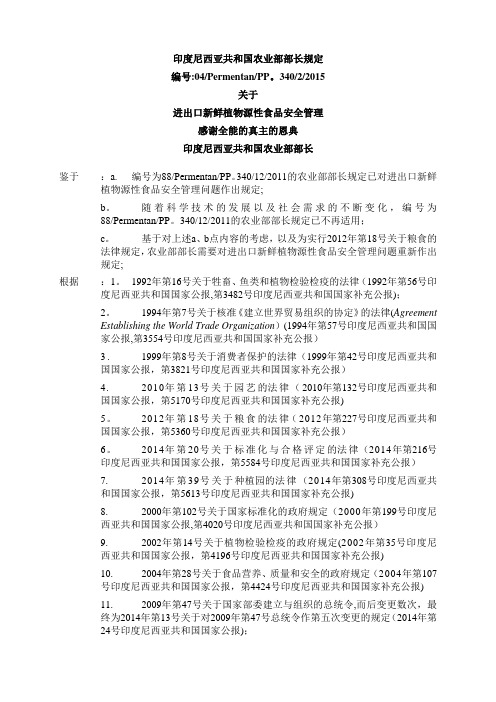
印度尼西亚共和国农业部部长规定编号:04/Permentan/PP。
340/2/2015关于进出口新鲜植物源性食品安全管理感谢全能的真主的恩典印度尼西亚共和国农业部部长鉴于:a. 编号为88/Permentan/PP。
340/12/2011的农业部部长规定已对进出口新鲜植物源性食品安全管理问题作出规定;b。
随着科学技术的发展以及社会需求的不断变化,编号为88/Permentan/PP。
340/12/2011的农业部部长规定已不再适用;c。
基于对上述a、b点内容的考虑,以及为实行2012年第18号关于粮食的法律规定,农业部部长需要对进出口新鲜植物源性食品安全管理问题重新作出规定;根据:1。
1992年第16号关于牲畜、鱼类和植物检验检疫的法律(1992年第56号印度尼西亚共和国国家公报,第3482号印度尼西亚共和国国家补充公报);2。
1994年第7号关于核准《建立世界贸易组织的协定》的法律(AgreementEstablishing the World Trade Organization)(1994年第57号印度尼西亚共和国国家公报,第3554号印度尼西亚共和国国家补充公报)3.1999年第8号关于消费者保护的法律(1999年第42号印度尼西亚共和国国家公报,第3821号印度尼西亚共和国国家补充公报)4. 2010年第13号关于园艺的法律(2010年第132号印度尼西亚共和国国家公报,第5170号印度尼西亚共和国国家补充公报)5。
2012年第18号关于粮食的法律(2012年第227号印度尼西亚共和国国家公报,第5360号印度尼西亚共和国国家补充公报)6。
2014年第20号关于标准化与合格评定的法律(2014年第216号印度尼西亚共和国国家公报,第5584号印度尼西亚共和国国家补充公报)7. 2014年第39号关于种植园的法律(2014年第308号印度尼西亚共和国国家公报,第5613号印度尼西亚共和国国家补充公报)8. 2000年第102号关于国家标准化的政府规定(2000年第199号印度尼西亚共和国国家公报,第4020号印度尼西亚共和国国家补充公报)9. 2002年第14号关于植物检验检疫的政府规定(2002年第35号印度尼西亚共和国国家公报,第4196号印度尼西亚共和国国家补充公报)10. 2004年第28号关于食品营养、质量和安全的政府规定(2004年第107号印度尼西亚共和国国家公报,第4424号印度尼西亚共和国国家补充公报)11. 2009年第47号关于国家部委建立与组织的总统令,而后变更数次,最终为2014年第13号关于对2009年第47号总统令作第五次变更的规定(2014年第24号印度尼西亚共和国国家公报);12。
- 1、下载文档前请自行甄别文档内容的完整性,平台不提供额外的编辑、内容补充、找答案等附加服务。
- 2、"仅部分预览"的文档,不可在线预览部分如存在完整性等问题,可反馈申请退款(可完整预览的文档不适用该条件!)。
- 3、如文档侵犯您的权益,请联系客服反馈,我们会尽快为您处理(人工客服工作时间:9:00-18:30)。
AMCHAM INDONESIAWorld Trade Center, 11th FloorJl. Jendral Sudirman Kav. 29-31, Jakarta 12920, IndonesiaTel: (62-21) 526-2860 Fax: (62-21) 526-2861Email: info@amcham.or.id Website: www.amcham.or.idClarification Brief/Working PaperEnvironmental Laws and RegulationsIssue SummaryProducing and distributing goods and services in an environmentally responsible manner is the primary objective of U.S. companies operating in Indonesia. American companies have a track record in effectively operating in complex and diverse regulatory environments and take pride in such leadership roles. Over the last 18 months, the Indonesian parliament has enacted several laws that impact how companies’ environmental performance shall be characterized, monitored and managed by regulatory bodies at the national, provincial and municipal levels. These laws, although good in their intent, raise a number of questions regarding their interpretation and implementation.The passing of Law 32/2009 (Environmental Protection and Management) and Law 18/2008 (Municipal Waste Management Act) brings about a number of implementing regulations, which are expected to provide guidance and clarity. This Clarification Brief/Working Paper (CB/WP) seeks clarification on the timing and format of consultation related to implementing regulations for Laws 32/2009 and 18/2008. More importantly, this CB/WP suggests clarification points to be inserted into such consultations, so key stakeholders engage in fruitful discussions that contribute to a greater understanding of and compliance with the law.Since AmCham represents a broad scope of industry sectors, the organization looks forward to the opportunity for engagement to ensure stakeholder concerns are considered.ObjectiveIn an effort to find a balance between environmental and social responsibility, economic development and operational efficiency, and under the provisions set forth by Law 32/2009 and Law 18/2008, AmCham seeks to work with the Indonesian government and other key stakeholders to develop a set of implementing regulations that support the intent of these laws within proposed guiding principles and objectives. Ultimately, AmCham seeks to contribute to regulations that promote clarity, transparency, consistency, efficiency and competitiveness.PositionAmCham expresses the following concerns and hopes to work closely with relevant government authorities to address these concerns during development of the respective implementing regulations:Environmental Protection and Management No. 32/2009Transition and Coordination•Firms operating without AMDAL will require an environmental audit within two years of the regulation’s passage, October 2009. Firms operating without a UKL-UPL shall formulate an environmental management document within two years of the passage of the Law. (Environment Law No. 32/2009 Article 121) Guidance is needed to clarify applicability, type of audit, the process for conducting audits and to what standard those audits will be carried. (Environment Law No. 32/2009 Paragraph 12)•Companies are now required to work within the framework of the Environmental Management Protection Plan (Rencana Perlindungan dan Pengelolaan Lingkungan Hidup) (Environment Law No. 32/2009 Article 12) and Strategic Environmental Impact Assessment (Kajian Lingkungan Hidup Strategis) (Environment Law No. 32/2009 Articles 15-17). These mechanisms, critical to regulatory and planning context of the Law, have yet to be defined. Given the operational experience of its members, AmCham would be interested in providing inputs (sharing insights and best practices) to the KLHS and RPPLH, particularly related to the analyses of environmental carrying capacity, methodologies for impact assessment, climate change impact and use of natural resources. (Environment Law No. 32/2009 Article 18)•Recognizing that Regulation of the State Minister of Environment 11/2006 requires firms conducting activities with significant impacts to conduct an AMDAL, and recognizing that Environment Law 32/2009 Article 23 indicates criteria for significance, it remains unclear if additional business activities will require audits. Clarification of which parties are qualified to perform the audits is also requested.•Ministry of Environment (MOE), other Ministries and local government must coordinate closely to oversee overlapping regulations, for example in connection with monitoring of the Environmental Law compliance in the oil and gas mining activities which lies with the Ministry of Energy and Mineral Resources, rather than the MOE (Article 41 of Law No. 22 of 2001 Regarding Oil and Gas). Oversight of this complex regulatory environment is especially important given the strong enforcement mechanism in Law 32/2009.•Clarification on ways Government plans to manage and enforce all related permits by both business and the government is needed to help facilitate and ensure compliance. The enforcement mechanism of the law relies on regional civil servants to interpret the law without the technical skills to fully understand environmental quality and the legal aspects of the regulations. The law does not indicate how compliance patterns will be monitored and how the health impact of chronic or acute non-compliance will be used to trigger action.•Clarification is requested regarding the provisions whereby all existing environmental management licenses shall be integrated into an environmental permit, specifically whether all existing licenses will be replaced by the environmental permit. (Environment Law No. 32/2009 Article 123)•Clarification on the coordination between MOE and the Minister of Communication with respect to the transportation of hazardous and toxic waste is required. (Environment Law No. 32/2009 Article 59)Environmental Permits•Requiring issuance of environmental permits prior to obtaining a business license will cause costly delays in establishing a business in Indonesia. Environmental permits become a “Super License” as no business permit can be issued without it. AmCham requests clarification on how compliance management will be implemented. The process of obtaining and revoking environmental permits is of concern given the consequence is denial or revocation of the business permit. It could mean that operation and production activities of a company can be shut down once it loses its environmental permit. Further, given the strengthened role of the AMDAL in the business licensing, AmCham would be interested in further understanding how permit conditions (RKL/RPL) will be monitored and managed.(Environment Law No. 32/2009 Articles 37 and 40)•Environmental permits should be issued automatically following AMDAL approval. AmCham recommends a single Government agency issue both the AMDAL approval and environmental permit concurrently. It is likely that the processes for issuing both will be similar and hence, redundant. Waiting for AMDAL approval to begin the process of issuing an environmental permit will make the process unnecessarily long and costly. (Environment Law No. 32/2009 Article 36)•It is unclear how firms currently operating will be impacted by the new requirement for obtaining environmental permits prior to obtaining a business license. Clarification is required as to whether a grandfather clause will be included in the implementing regulations or existing companies will be subject to the new requirement. If existing companies will not be grandfathered-in, AmCham requests guidance on the renewal and timing of existing business licenses. (Environment Law No. 32/2009 Article 40)•Clarification is required on the issuance of environmental permits for projects requiring multiple-levels of AMDAL (UKL-UPL) approval, specifically after which approval stage environmental permits can be issued.•Clarification of the environmental risk analysis component, which appears to overlap with the AMDAL, is requested. (Environment Law No. 32/2009 Article 47)Industry Responsibility in Managing Environmental Quality•Clarification on the environmental reserve requirement is necessary, specifically, identification of scope of remediation, characterization of costs assumed by firms, time period for payment, and the process for effectively establishing reserves. Additionally, the rights of industry in establishing and using funds earmarked for environmental damage or restoration purposes must be explained, specifically determining the amount of funds to be earmarked, addressing financial losses due to opportunity cost and diminishing value of earmarked funds, and avoiding third party abuse when restoring environmental function. (Environment Law No. 32/2009 Article 55)•Transparency and security of funds while under government management must be elucidated.Clarification is requested to address concerns over the present value of money, specifically accrual of interest, and mechanisms for Government management of resources, including those funds that ultimately are unused. (Environment Law No. 32/2009 Article 55)•Clarification is requested on whether funds spent to meet “Environmental and Social Responsibility” requirements are tax deductible. (Law of the Republic of Indonesia Number 40/2007 concerning Limited Liability Companies Article 74)•Clarification is requested on the guarantee fund for environmental restoration which appears to overlap with the provisions regarding the reclamation and post-mining guarantees under the mining laws. (Environment Law No. 32/2009 Article 55)•Clarification is requested on the guarantee fund for environmental restoration since there is potential for “double charge” with the platform decommissioning fund or Asset Retirement Obligation which is stipulated under the Production Sharing Contract for upstream oil and gas businesses. It could also potentially increase the cost recovery. (Environment Law No. 32/2009 Article 55)•Clarification is needed on the range of risks and associated thresholds in terms of assessment, management, monitoring, and communication. (Environment Law No. 32/2009 Article 47)•Clarification is needed on industry’s responsibility to safeguard environmental quality and to provide environmental data in an accurate and timely fashion. (Environment Law No. 32/2009 Article 68)• A clause to address “abnormal” and “emergency” conditions that may cause the environmental quality standards or effluent/emission standards to be exceeded is required. In the absence of such guidance from the implementing regulations, the “abnormal” or “emergency” condition could be perceived as environmental pollution based on the definition of Environmental Pollution in Environment Law No 32/2009 Article 1.•The determination of environmental standards is crucial. The existing MOE’s environmental standards do not distinguish new facilities from those in operation prior to the new standards.Existing facilities were designed and constructed based on previous standards and are not capable of meeting the new standards immediately. As with environmental permits, clarification is required as to whether a grandfather clause will be included in the implementing regulations on new environmental standards. If existing companies will not be grandfathered-in, AmCham requests a grace period (transition period) of a few years be granted to allow firms to upgrade facilities to comply with the new standards. Without this allowance, considerable parts of the extractive industries (mining, oil & gas, manufacturing, etc.) will have to be shut down. Such an event would significantly impact the country’s economy and the income of many people.(Environment Law No. 32/2009 Article 20)•It is suggested the implementing regulations clarify that discharge and effluent standards be based on the environmental carrying capacity of the receiving media (Ministry of Environment Regulation No 4/2007 concerning Effluent Standards for Oil and Gas and Geothermal), instead of applying the same environmental standards regardless of the environmental carrying capacity.Additionally, discharge permit conditions (Ministry of Environment Decree No 12/2006) should be based on scientific study (modeling/assessment). (Environment Law No. 32/2009 Article 20)•It is advised to set up an implementing regulation (guidelines) for dumping permits. The issues in the oil and gas industry include, but are not limited to, the dumping of drilling mud and cuttings, produced sand and hydrostatic water. Specifically for drilling mud and cuttings, it is recommended that the Ministry of Energy and Mineral Resources Decree No 45/2006 be used asreference in the absence of guidelines for dumping permits from the Ministry of Environment.(Environment Law No. 32/2009 Articles 60-61)•With regards to environmental quality standards, AmCham recommends establishing a mechanism whereby entities can apply for variance to the standard if justifiable and supported bya thorough scientific study. (Environment Law No. 32/2009 Article 20)Enforcement and Litigation•Clarification is requested regarding legal protections for individuals and organizations that report and press charges against a firm accused of violating environmental regulations. There is concern that the law eliminates personal accountability and allows parties to intentionally threaten a company without justification due to the prohibition of a mechanism for retribution, namely the ability of firms to respond through criminal or civil suit in a court of law. (Environment Law No 32/2009 Article 67)•Recognizing increased cooperation between civil servant investigators and police, there remain concerns with the extended authority of civil servants to conduct investigations and arrest and detain offenders. The government is requested to clarify its role in enforcing the law when investigating allegations from organizations and the public. (Environment Law No. 32/2009 Article 94)•Clarification is needed on the public right to sue - in particular, in the context and definition of empowerment, enforcement and material loss or other types of claims including the community’s objection to the AMDAL document [Article 26(4)] and the judicial process and jurisdiction.(Environment Law No. 32/2009 Article 92)Municipal Waste Management Act No. 18/2008•Regarding new labeling requirements, guidance is needed on labeling standards (e.g the scope of information to include) and applicability of labeling requirements, specifically the type of good to be labeled and source (e.g. domestic versus import). (Municipal Waste Management Act No.18/2008 Article 14)•Clarification is required on producer obligations to manage non-biodegradable packaging and products. Items to address include the range of packaging and products affected by the requirement, limits to the length of firm responsibility for packaging and products, and elaboration on management processes. (Municipal Waste Management Act No. 18/2008 Article15)•Requirements for recycling or processing waste and by-products are vague. Waste management companies and agricultural producers need direction on how to process wastes from their operations as well as clarification on what types of waste are regulated. There is some concern that the definition of waste is too narrow.(Municipal Waste Management Act No. 18/2008)•Financial incentives should be considered in order to encourage municipal waste companies to adapt new and clean technology rather than require composting through new regulations.Regulatory requirements to compost waste remove the possibility of financial incentives such as carbon credits. (Municipal Waste Management Act No. 18/2008)。
